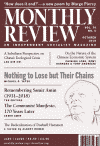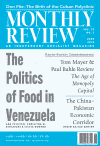Political Economy

China’s economic development and success has been widely misunderstood and treated with perplexity. This overview of the Chinese economy provides an analysis of the drivers of the country’s growth and crises, including industrialization and the agrarian question. | more…

“Mythologies,” writes veteran human rights lawyer Michael Tigar, “are structures of words and images that portray people, institutions, and events in ways that mask an underlying reality.” For instance, the “Justice Department” appears, by its very nature and practice, to appropriate “justice” as the exclusive property of the federal government. In his brilliantly acerbic collection of essays, Tigar reveals, deconstructs, and eviscerates mythologies surrounding the U.S. criminal justice system, racism, free expression, workers’ rights, and international human rights. | more…

In this excerpt from The Accumulation of Capital, Rosa Luxemburg explains how classical political economy lacks a clear conception of the commodity—both in the terms of the distinctions between use value and exchange value, as well as between concrete and abstract labor. This metaphysical, essentialist framework leads to a complete failure to understand the social character of labor’s capacity to create value. | more…

There is considerable interest in the history and characterization of China’s economy. This overview of the evolution of the renminbi from the late Qing dynasty to the present, shows how China’s political and economic changes in the twentieth and twenty-first centuries are reflected in the development of its highly contested modern currency system. | more…

This issue is dedicated to remembering the life and work of Samir Amin (1931–2018), the greatest single theorist of imperialism of the late twentieth and early twenty-first century, and one of the leading world activists and organizers in today’s anti-imperialist struggle. | more…

There is considerable debate within China about the nature of the economy, including recognition of tendencies toward state capitalism. Consequently, most writers focus theorization of the many possible paths the economy could take—whether toward or away from capitalism. The present article takes a step further, arguing that the Chinese system today still contains some key components of socialism and is compatible with a market, or market-based, socialism that is clearly distinct from capitalism. | more…

The modernization paradigm pursued by China has tended to privilege industry over agriculture, urban over rural, and the middle class over the subaltern, with the country’s growth statistics and policy emphases accordingly geared to such a paradigm. This has resulted in almost mindless degradation of nature. The key question China faces is thus not one of more progress or more growth, but of the multiple tasks of reversing the dire damage already done to its ecology, society, and culture. | more…

The South African political class appears to have finally recognized the depth of the crisis into which the country’s capitalist system has sunk. Can the government’s new Radical Economic Transformation program begin to address the profound inequalities that remain at the heart of South African society? | more…

Since the late 1990s, China’s economic expansion has depended on an immense pool of cheap labor. Today, as wages increase and manufacturing operations leave the country, there are constant complaints about shortages of peasant workers. But has China really entered a new era of labor shortage? | more…

Throughout China’s nearly seventy-year history of industrialization and financialization, whenever the cost of an economic crisis could be transferred to the rural sector, capital-intensive urban industries have had a “soft landing” and existing institutional arrangements have been maintained—a pattern that continues today. We argue that Chinese peasants and rural communities have rescued the country from no fewer than ten such economic crises. | more…

In recent years ecological critiques of capitalism have deepened and multiplied, resulting in new debates over the conception, scope, and purpose of Marx’s value theory and its relation to the natural world. | more…

With the eruption in March of the scandal around Cambridge Analytica and Facebook, articles raising the alarm on “surveillance capitalism” are suddenly everywhere. The term, which was coined in MR in August of 2014, was developed to highlight the links between digital spying systems and contemporary capitalism as a whole. Academic interpretations of the concept effectively divorced surveillance capitalism from class analysis, and from the overall political-economic structure of capitalism—as if surveillance could be abstracted from monopoly-finance capital as a whole. | more…











